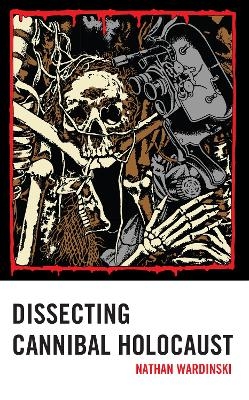
Dissecting Cannibal Holocaust
Seiten
2024
Lexington Books/Fortress Academic (Verlag)
978-1-6669-1402-3 (ISBN)
Lexington Books/Fortress Academic (Verlag)
978-1-6669-1402-3 (ISBN)
Dissecting Cannibal Holocaust examines the layers of Ruggero Deodato’s controversial horror film including its relevance to cinematic and literary history, anthropology, nature studies, ethics and censorship, media and journalism, documentary filmmaking, representations of post-colonialism, and genre cinema.
Since its release in 1980, the Italian cannibal film Cannibal Holocaust has shocked and provoked viewers with its graphic imagery and unrelenting nihilism. Banned all over the world, Cannibal Holocaust is regarded as one of the most controversial films ever released.
Following a summary of the story and the controversy over its release, Dissecting Cannibal Holocaust examines the film’s relevance to cinematic and literary history, anthropology, nature studies, ethics and censorship, media and journalism, documentary filmmaking, representations of cannibalism and post-colonialism, and genre cinema. The book also addresses some of the most frequent criticisms of Cannibal Holocaust including its depictions of native people and the inclusion of real-life animal killings. Matching the audacity of the film itself, Dissecting Cannibal Holocaust makes provocative arguments about the influence of corporate media, the purpose of art, the relationship between industrialized and indigenous people, the amorality of nature, and the roots of violence.
Since its release in 1980, the Italian cannibal film Cannibal Holocaust has shocked and provoked viewers with its graphic imagery and unrelenting nihilism. Banned all over the world, Cannibal Holocaust is regarded as one of the most controversial films ever released.
Following a summary of the story and the controversy over its release, Dissecting Cannibal Holocaust examines the film’s relevance to cinematic and literary history, anthropology, nature studies, ethics and censorship, media and journalism, documentary filmmaking, representations of cannibalism and post-colonialism, and genre cinema. The book also addresses some of the most frequent criticisms of Cannibal Holocaust including its depictions of native people and the inclusion of real-life animal killings. Matching the audacity of the film itself, Dissecting Cannibal Holocaust makes provocative arguments about the influence of corporate media, the purpose of art, the relationship between industrialized and indigenous people, the amorality of nature, and the roots of violence.
Nathan Wardinski is producer and host of the public radio program Sounds of Cinema.
Chapter 1: The Making and Release of Cannibal Holocaust
Chapter 2: Narrative, Genre, and the Roots of Cannibal Holocaust
Chapter 3: Character and Culture in Cannibal Holocaust
Chapter 4: Nature and Cannibal Holocaust
Chapter 5: Anthropophagy and Cannibal Holocaust
Chapter 6: The Film Form of Cannibal Holocaust
Chapter 7: The Media and Cannibal Holocaust
Chapter 8: The Horror of Cannibal Holocaust
Chapter 9: The Ethics of Cannibal Holocaust
Chapter 10: The Future of Cannibal Holocaust
| Erscheinungsdatum | 12.04.2024 |
|---|---|
| Reihe/Serie | Lexington Books Horror Studies |
| Zusatzinfo | 10 BW Photos |
| Sprache | englisch |
| Maße | 158 x 237 mm |
| Gewicht | 549 g |
| Themenwelt | Geisteswissenschaften ► Philosophie ► Ethik |
| Sozialwissenschaften ► Kommunikation / Medien ► Medienwissenschaft | |
| ISBN-10 | 1-6669-1402-9 / 1666914029 |
| ISBN-13 | 978-1-6669-1402-3 / 9781666914023 |
| Zustand | Neuware |
| Informationen gemäß Produktsicherheitsverordnung (GPSR) | |
| Haben Sie eine Frage zum Produkt? |
Mehr entdecken
aus dem Bereich
aus dem Bereich


